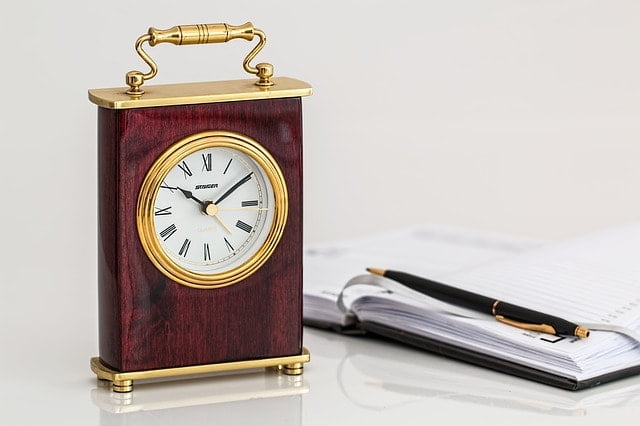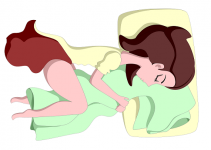
A normal monthly menstruation usually occurs on 1st to 7th day in a 28 day cycle, yet not everyone receives a regular period every month. Many women are often surprised with an early period that can sometimes cause confusion.
Periods that arrive early or late may be due to hormonal imbalances, and should be checked out if this occurs on a regular basis.
While irregular periods are certainly inconvenient, they are fairly common among women and can be caused by a variety of conditions that affect normal bodily cycles of menstruation and ovulation.
Early menstrual periods can be the result of anything from lifestyle choices to hormonal imbalances. They may also be the result of a gynecologic health issue that needs to be addressed.
Here are some of the main reasons for getting your period earlier than anticipated:
1. Hormonal Imbalance
A shift in the balance of hormones is often the culprit of early period cycles. Using oral contraceptive such as birth control pills can cause the menstruation cycle to begin at an earlier time than usual, especially if you skip a pill or two, since the hormones produced by the body become disrupted by the artificial hormones in the pill.
Birth control pills are supposed to be taken on a daily basis at the same time each day. This allows your hormones to stay in a steady state and allow your periods to come on a regular basis.
If you skip a few pills or take your doses at varying times throughout the day, then you may have irregular periods. You may also experience effects of abnormal bleeding after you stop taking the pill.
Other forms of contraceptives, such as IUDs, can also cause an imbalance of hormones that can affect your period and change your ovulation cycle.
IUDs come in hormonal and non-hormonal forms. If you decide on an IUD that does release hormones, then you may initially have irregular periods until your body adjusts to the IUD.
Hormonal disorders, which can result from diseases such as endometriosis, can also be a reason for period irregularity and should be checked.
Signs and symptoms of endometriosis include nausea, vomiting with painful periods (dysmenorrhea), pain during bowel movements (dyschezia) or urination, excessive menstrual bleeding, rectal bleeding, pain during intercourse (dyspareunia) [1].
2. Psychological effects
Stress is a common factor in the case of irregular periods, and dealing with psychological anxieties can have an effect on the body’s normal functioning.
Dealing with extra stress and anxiety can trigger chemical/hormonal responses and disrupt the normal body systems that regulate ovulation and menstruation.
Cortisol, the stress hormone, can decrease the production of estrogen and progesterone in the body resulting in abnormal ovulation, anovulation, or amenorrhea [2].
If you are feeling stressed out, then your body will produce more cortisol, which can disrupt your hormonal balance.
While stress and anxiety often cause late periods as well, it can disrupt the hypothalamus-pituitary axis (HPA) to make your period come earlier than expected.
With added stress, you may experience early or late periods, or a mixture of both if the stressor continues for months at a time.
3. Gynecologic conditions
Some gynecologic conditions can cause early menstruation, as well as bleeding in between periods.
Polycystic ovarian syndrome is a condition in which multiple cysts develop in ovaries leading to hormonal imbalance (higher levels of androgens and luteinizing hormone than FSH) in the body. Because of this reason, the follicles fail to mature causing anovulatory cycle and consequently irregular bleeding [3].
Endometriosis can also cause early periods as well as very painful menstrual bleeding.
4. Implantation bleeding
Sometimes, what you may think is your period coming early may not be your period at all. Many people mistake implantation bleeding for their period, and so the abnormal bleeding you are experiencing could be a sign of early pregnancy if you are sexually active.
Implantation bleeding happens when an embryo is implanted into the uterine cavity, causing some abnormal bleeding before your actual period begins.
If you are trying to get pregnant, or have had unprotected sex, then this spotting could point to pregnancy and not be an actual period.
5. Lifestyle choices
Factors related to your life, including diet and exercise, can have a great effect on the regularity of your period.
Excessive and strenuous exercise can disrupt your body’s menstrual system and result in an earlier period, or cause you to lose your period all together.
What you eat also has an effect on whether your period comes early or late, and how bad it is. Excessive weight gain and loss cause fluctuating hormone levels that can result in an early period.
Excessive weight gain can cause hormone levels to rise since adipocytes, or fat cells, can contribute to estrogen excess. If you have gained excessive weight very quickly, then you may experience period irregularities.
6. Menopause and puberty
Going through menopause causes the hormone levels to fluctuate within the body, which can result in irregular period cycles that can start as early as 10 years before menopause actually begins.
Since menopause results in the ceasing of the ovulation cycle in a woman, as a woman approaches menopausal age, their period may become more sporadic.
On the other hand, it is normal for teens to experience irregular periods as their body adjust to rise in female hormones after menarche, and so early periods are quite common during this time.
In order to better regulate your menstrual period, you can change up your lifestyle routine to get your cycle back on track.
Eating a healthy, balanced diet and avoiding any dramatic weight changes can regulate your hormone levels and regulate your period.
Image: Pixabay
References
-
1. https://www.mayoclinic.org/diseases-conditions/endometriosis/symptoms-causes/syc-20354656
2. https://www.sciencedirect.com/science/article/pii/S0167876017302696
3. https://www.verywellhealth.com/why-do-women-with-pcos-have-irregular-periods-2616650




HI I AM 44 YEARS OLD. I LAST SAW MY PERIOD REGULARLY WHEN I WAS 38. NOW IT HAPPENS ONE’S A YEAR. I WANT TO KNOW IS IT NORMAL, OR AM I SICK?
Yes, it’s normal to have irregular or occasional periods when you’re at extremes of reproductive age. There are no medications or treatments to offer you for that. Peri-menopausal women suffer from other lists of symptoms such as flushing, sweating, mood swings, etc. and they can be treated.
Hi i’m 17 and have had my period like a week early which has never happened before and its not much either and I have period pain and I don’t really want to speak to my dad about it so
Hello Tara, period fluctuations are normal during the teenage years due to a lot of hormonal changes. You should never be ashamed talking to anyone about your health, even less to the person who is probably the most concerned about your well being,
I used to only have my period for 4 days and now it’s 6 days which feels like a lifetime… It’s either late or early and I’m only 21. I don’t have any std’s but I have had ovarian cyst in the past. Should I go to the doctor?
Hello Ariel, Its always better to check up with your doctor when you are expiriencing something irregular. 6 days is not really something to worry about., normal period lasts from 3 to 7 days.
Hi am Edna . Last month I didn’t have a normal period as usual. The waste that come out was small than previous months. As of now I am supposed to expect my period but it hasn’t shown a sign. And also my period changes date every month. Pls what should I do
Hi Edna, is there a possibility that you could be pregnant? If there is then I would take a pregnancy test. However, seeing that your period is never the same (however not on the same date is normal for a cycle that is 28 days so the dates would naturally change) then you might still get your period.
I got my period 6 days earlier and I am 22 year old. Is it normal?
Hi Shanaya, it can be if there were other things going on in your life, stress, illness (which usually delays it), new birth control, changing birth control, etc can change your period. Keep track and see when you get your next one.